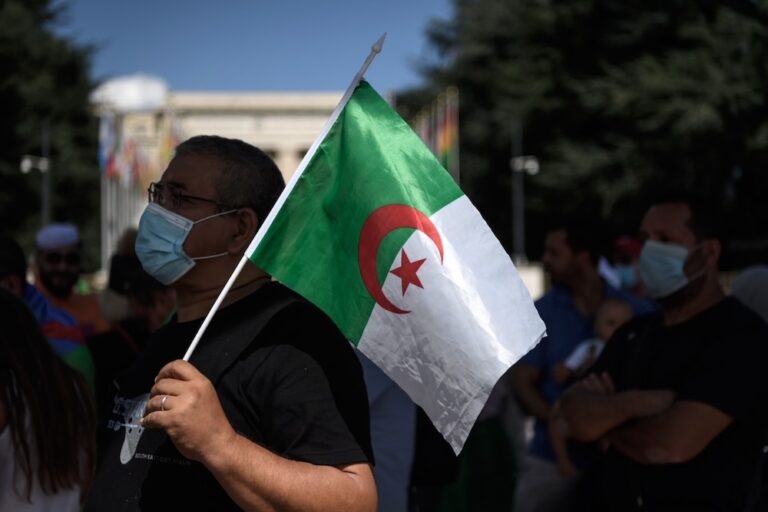(RSF/IFEX) – The following is a 23 April 2001 RSF press release: Penal Code amendment bill RSF appeals to Algerian parliamentarians and a European delegation visiting Algiers With the Penal Code amendment bill currently before parliament, Reporters sans frontières (RSF) urges Algerian parliamentarians to reject the text, which includes provisions for prison sentences and fines […]
(RSF/IFEX) – The following is a 23 April 2001 RSF press release:
Penal Code amendment bill
RSF appeals to Algerian parliamentarians and a European delegation visiting Algiers
With the Penal Code amendment bill currently before parliament, Reporters sans frontières (RSF) urges Algerian parliamentarians to reject the text, which includes provisions for prison sentences and fines for press offences. On 22 April, the minister of justice, Ahmed Ouyahia, defended the bill before parliamentarians, saying that the Algerian press currently has “too much” freedom. “We plan to stop the insults and defamation,” he said. RSF believes that the text’s adoption would constitute a serious setback for press freedom, which is already fragile in Algeria. The organisation recalls that in January 2000, Abid Hussain, the United Nations’ special rapporteur on the right to freedom of opinion and freedom of expression, asked all governments “to ensure that press offences are no longer punishable by prison sentences, except in cases involving racist or discriminatory remarks or calls to violence.” Moreover, the imposition of exorbitant fines is a sure way to close newspapers that are critical of the authorities.
RSF is also asking the European delegation which will be visiting Algeria as of 24 April to take up the issue of press legislation with the Algerian authorities. While the European Union and Algeria have relaunched negotiations towards the signature of an associative agreement, the organisation recalls that the agreement includes a so-called “human rights” clause. Article 2 stipulates that relations between the parties is based on the principles of respect for democracy and human rights, including press freedom. Yet, if the Penal Code amendment bill is adopted by the assembly, it will seriously compromise freedom of expression.
The presentation of this bill before the assembly comes just as three journalists were recently sentenced to prison terms for “defamation.” On 7 April 2001, Oran’s tribunal sentenced Arab Izarouken, publication director of La Voix de l’Oranie, and Aouari Abdelkrim, local columnist with the same newspaper, to six months’ imprisonment. The two men were prosecuted for publishing an open letter on 1 November 2000, titled “To the Vultures of Oran’s Politico-administrative and Financial Mafia.” In the article, a local personality named fourteen persons and described them as “a local mafia, responsible for the squandering of land in Oran.” The journalists have appealed their sentences.
On 17 April 2001, Ahmed Benaoum, publication director of the Oran-based Arabic-language daily Al Raï, was informed by Oran’s tribunal that the Supreme Court had confirmed his sentence to two months’ imprisonment for “defamation,” a decision rendered on 12 July 2000. That same day, the same tribunal told him that he would not be imprisoned since he received a presidential pardon on 30 October 2000! Ahmed Benaoum received the notification of his pardon but not the notification of his sentence. Having not understood these court decisions, Al Raï’s director decided to ask the minister of justice to launch an inquiry. Ahmed Benaoum was prosecuted for publishing a 3 December 1998 article in which he implicated a senator in a corruption case.
The amendment bill’s first clause – Article 144 b – stipulates that any person who “offends” the president through an expression deemed “offensive, insulting or defamatory, be it orally, in drawings, declarations or through the support of any other electronic, computer or information means,” is punishable by “imprisonment of one to three years” and “fines of 100,000 to 1 million dinars [1,500 to 15,000 euros],” or “one of these two sentences only.” Moreover, Article 144 b1 specifies that “when the infraction targeted in Article 144 b is committed through a daily, weekly or other publication, legal proceedings will be launched against the author of the insult, the managers and editors of the publication, as well as the publication itself.” In this instance, the authors of the infraction are punishable by “imprisonment of one to three years” and a “fine of 100,000 to 1 million dinars” or “one of these two sentences only.” For its part, a publication incurs a fine of “500,000 to 5 million dinars [7,500 to 75,000 euros]”. In both instances, the Prosecution can launch legal proceedings directly. In case of a subsequent offence, the prison sentences and fines are “doubled.” These sanctions are also applicable in cases where offences are committed against the “Parliament or one of its two Houses, the ANP [National Popular Army, Armée nationale populaire]”, and any “other public institution or constituent body.”


